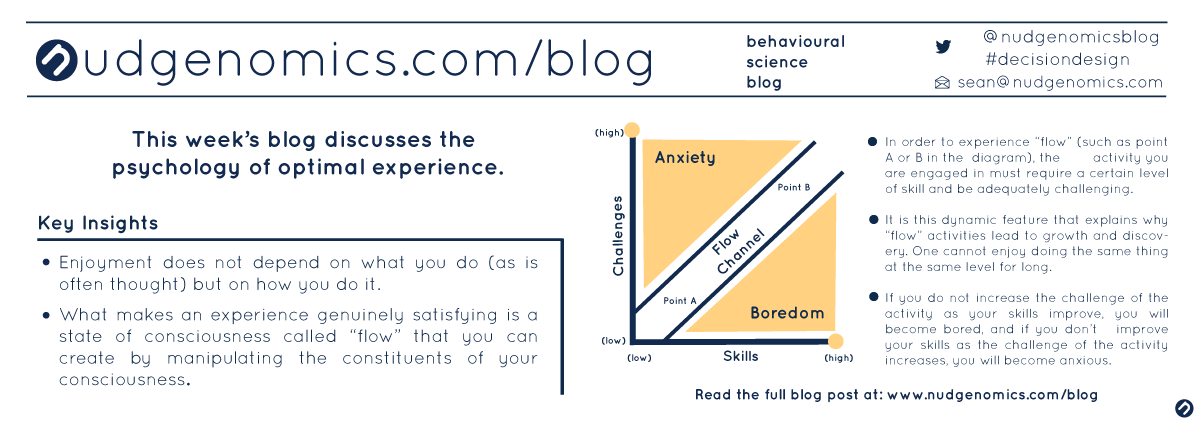A discussion on the psychology of optimal experience.
This post discusses the book “Flow: The Psychology of Optimal Experience” by Mihalyi Csikszentmihalyi.
“Flow” is as much a treatise on how one should approach living and meaning, as it is an an analysis of “optimal experience” (i.e. what makes an experience genuinely satisfying) . Having spent his career investigating this phenomena, this aptly titled book discusses Csikszentmihalyi’s main findings; namely that what makes an experience genuinely satisfying is a state of consciousness called “flow” and that enjoyment does not actually depend on what you do (as is often thought) but rather on how you do it.
In an effort to define the different elements of enjoyment, Csikszentmihalyi and colleagues ran a number of studies on how people describe what they are doing and feeling when they experience “deep enjoyment, creativity and total involvement with life”. Two surprises findings they found were firstly in how similar very different activities were described by the participants when they were having a particularly enjoyable experience. For example, the description of “how a long-distance swimmer felt when crossing the English Channel was almost identical to the way in which a chess player felt during a tournament or a climber progressing up a difficult rock face”. Secondly, was that regardless of the culture, socio-economic status, age or gender of the participant, they described enjoyment in very much the same way. In short Csikszentmihalyi concludes that “optimal experience, and the psychological conditions that make it possible, seem to be the same the world over”.
The phenomenology of enjoyment has eight major components and when people reflect on how it feels when they are in flow, they tend to mention at least one, if not all, of the eight components. So, if you want to think about how you can work towards an optimal experience, you need to ensure that:
- You confront a challenging activity that requires skill and that you have a chance of completing;
- You have the ability to concentrate on what you are doing (merging of action and awareness);
- The activity you are undertaking has clear goals;
- And immediate feedback;
- Your deep but effortless involvement in the task removes the worries and frustrations of everyday life from your mind;
- You are able to exercise a sense of control over your actions;
- Your concern for self disappears (but paradoxically emerges stronger after your flow experience is over);
- During the completion of the activity), the sense of the duration of time is altered (hours pass by in minutes).
An activity that produces such experiences is so gratifying that people tend to be willing to do it for its own sake, regardless of what they will get out of it in the end.
In order for you to create your own optimal experiences you must begin by establishing control over your attention, as this determines the shape and content of your life. Your consciousness consists of the things that you see, feel and desire, and this is all information that you can manipulate and re-shape for your own purposes. It is useful to think of your consciousness as “intentionally ordered information” that gives you the ability to control your subjective reality. For example, you can make yourself happy, or miserable, regardless of what is actually happening “outside”, just by changing the contents of your consciousness. As such, one of the most important traits to develop in order to have a fulfilling, successful and enjoyable life is the ability to persevere despite unforeseen obstacles, and to transform apparently hopeless situations into challenges to be overcome.
Also, as the the largest part of your life is spent working and interacting with others (especially with members of your family), it is pretty important to think about how you can transform your job and personal interactions into flow-producing activities. Csikszentmihalyi humorously notes that: “One of the most ironic paradoxes of our time is this great availability of leisure that somehow fails to be translated into enjoyment”.
Csikszentmihalyi concludes his treatise by discussing learning to control the body, its senses, and ones ability to enjoy solitude: “A person who rarely gets bored, who does not constantly need a favourite external environment to enjoy the moment, has passed the test for having achieved a creative life”.
How can the insights from this book help you to improve the way in which you live your life?
- You should spend time actively choosing how you will spend your time and how you will focus your attention. This will give you the power and control over your moment-to-moment experiences that are essential in order to experience flow.
- You should think about how you can cultivate the ability to persevere despite obstacles; this involves transforming apparently hopeless situations into challenges to be overcome. In order to do this, you will need to think about how you can reframe your situation as an opportunity to grow and develop (this is one of the best qualities you can develop as a person).
- Practically speaking, you can use the eight major components of Csikszentmihalyi’s phenomenology of enjoyment to evaluate your different activities and to guide you as to how your activities can be changed to be more likely to induce flow.
If you would like to read more on the topic, I would recommend reading the complete book “Flow: The Psychology of Optimal Experience” by Mihalyi Csikszentmihalyi. Other interesting reads by Csikszentmihalyi include:
- “Finding Flow: The Psychology of Engagement with Everyday Life:, New York: Basic Books, 1997.
- “Creativity: Flow and the Psychology of Discovery and Invention”, New York: Harper Collins, 1996.
- “The Evolving Self: A Psychology for the Third Millenium”, New York, Harper Collins, 1993.
Our next post will discuss “Scarcity: The New Science of Having Less and How It Defines Our Lives” by Sendhil Mullainathan and Eldar Shafir.
Ps – If you have enjoyed this post and would like us to email you our future posts on behavioural science, please sign-up to our mailing list here and follow us on twitter @nudgenomicsblog.

